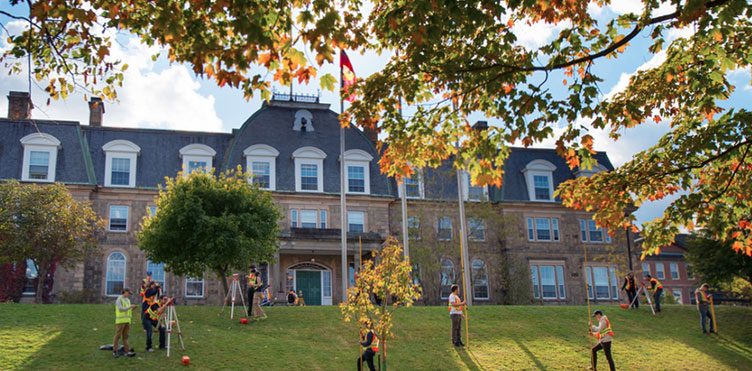Innovative careers for creative thinkers

A part of UNB's mission is to provide you with a transformative student experience encouraging initiative and innovation by unlocking your creative potential and exploring your entrepreneurial spirit, we commit to helping you understand and solve the problems of today and tomorrow.
As graduates, you will be prepared to make a significant difference in the world creating opportunities for yourselves and for others.
Take charge of your career planning
Different stages of your education include different tasks for your career planning. It is important to keep in mind that not all students plan their career paths the same way, nor at the same pace and this is okay.
First year
Transition, adjustment and exploration.
- find your way around campus and get involved with events
- develop your academic skills, study skills, exam preparation, essay writing and research skills
- explore and clarify your academic interests. Choose new and interesting courses and program pathways
- consider opportunities available through the work-study or study abroad programs
- identify problems or struggles and take action to overcome them
Second year
Career assessment and research
- take time to identify your personality, strengths, interests, values and how these relate to your career options
- explore work options in your field of study ("What can I do with a degree in....?")
- build non-academic and transferable skills
- develop leadership experience through campus and community activities
- if uncertain about your career direction, book a career consultation
- attend job fairs for summer employment
- attend career fairs for career networking and future planning
Third year
Get specific
- research work opportunities, graduate schools and options
- register for and write admission tests, such as LSAT/MCAT (this process can take up to a year)
- try job shadowing and information interviewing to find out what the work is really like
- clarify your short and medium term career goals
- develop resume-writing and interviewing skills
- do a "grad check" or "program audit" to ensure you will meet the requirements to graduate from your program next year
Fourth or final year
The final push, transition to work or grad school
- apply to graduate schools and/or professional programs in the fall term
- target employers starting in September
- attend job and career fairs
- develop creative work search skills and self-marketing strategies
- learn what it takes for success on the job
- remember that you must apply to graduate
Career planning leads to more informed academic choices that are better linked and more relevant to your interests. Students who participate in career planning and skill-based workshops have heightened motivation, understand career planning and preparation and the importance of researching options.
Career development support
With help from our campus career experts and academic advisors, you will become a self-directed, employment-ready, life-long learner and innovator using campus resources to identify your career aspirations, personal strengths and work interests as you plan your future career.
Campus resources
Fredericton campus
- Career fairs
- Career information and planning workshop
- Employability skills and work values workshop
- Interview skills workshop
- Job search strategies workshop
- Resume and cover letter workshop
- Self-directed search (SDS) and workshop
- Social Media Workshop
- Work-study program
For more information connect with the Career Development and Employment Centre, Neville Homestead, 58 Mackay Drive.
Saint John campus
- Brainstorming academic and career ideas
- Developing an action plan
- Developing skills
- Finding satisfying jobs and careers
- Making decisions about programs and careers
- Researching possibilities and options
- Self-exploration
Meet with one of your Career Counsellors, Oland Hall, room G25 who will help you move through the career planning process.
Academic advising
Academic advising is an important aspect of career exploration. It is through your academic advisor that you will explore programs and fields of study, discussing how these fit your career goals.
All undergraduate students are assigned an academic advisor who has expertise in your academic program of study. Find your advisor in the Academic Advisor Directory.
